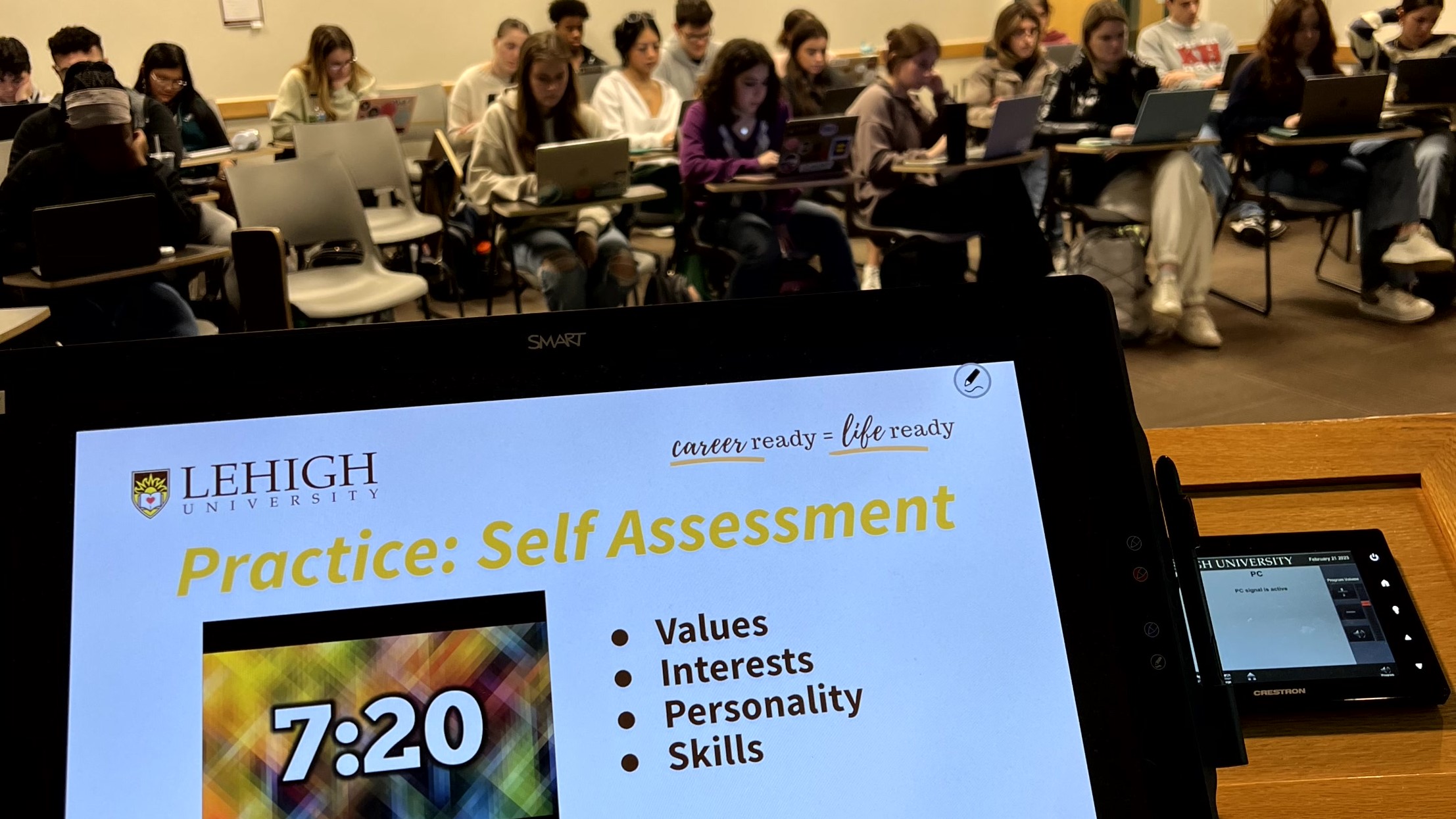
Engineering students typically anticipate taking college classes in core subjects such as calculus, physics, and chemistry, but the need to build skills specific to launching a career might not be on their radar.
”When I was in high school, little to no help was provided on that matter,” says sophomore civil engineering major Rachid Seraphin, “or at least it wasn’t a well-known offering.”
Lehigh’s Center for Career and Professional Development (CCPD) offers education and resources to fill that need. In the past, Rossin College students have worked with the office on a voluntary basis.
Although success outcomes are high—96 percent of engineering undergraduates in Lehigh’s Class of 2023 were employed, continuing their education, or pursuing military or volunteer service within six months of graduation, according to the First Destination Report—the CCPD team recognized that the voluntary participation created an inequity between students who thought to seek out help from the career center and those who did not.
Today, professional development isn’t optional for Lehigh engineers; it’s folded into engineering classes students are already taking, thanks to a new career readiness curriculum implemented in August 2023. The program supports the university’s goal to provide equity in career education through class presentations aimed at providing all students the same chance of future success outside of the classroom.
“We knew that not all of our students were getting the information that they needed to maximize their degree and to find the best opportunities after graduation,” says Christine Russell, the CCPD’s director of career education. “By fully integrating these programs into the curriculum, we’re ensuring that Lehigh engineering students will receive core competencies for a strong outcome.”
Engineering positions can be highly competitive, so students must have the knowledge and skills that will make their application and interview stand out, such as an understanding of what specific experiences and education should be highlighted.
“It’s challenging for students to secure full-time positions without having the foundational competencies to design their job search,” says CCPD Senior Director Lori Kennedy. “Knowing the national landscape and the global job market where employers are posting positions—the level of competition is incredibly fierce. We hear it from our employer partners, who are conducting interviews. Employers often start with a candidate pool of a couple hundred applications and then funnel that down to a dozen candidates for interviews. Out of those, maybe four students are invited back for second-round interviews and then one or two students receive offers.”
For example, Kennedy says, if a student applies to a company like Lutron or Air Products, their resume will be dropped into an applicant tracking system. “We have AI tools that will scan a student’s resume to make sure students have the appropriate keywords, to ensure they’re not eliminated by the applicant tracking system,” she says.
Bill Burden, the CCPD’s associate director for the Rossin College, began developing the curriculum in the summer of 2022 by surveying engineering faculty to assess their perceptions of student career readiness. “I was thrilled to receive 50 responses from faculty members across each of the eight engineering departments,” he says. “This survey was instrumental in shaping our approach, helping to identify key themes and drawing connections to career competencies outlined by NACE, the National Association of Colleges and Employers, that would serve as the foundation for our career integration goals and educational content.”
After reviewing the feedback from the survey, Burden worked with faculty members and successfully piloted 12 “career readiness touch points” delivered in the form of class presentations and associated required assignments in the core sophomore courses for each engineering major. Topics included how to find an internship, build a presence on LinkedIn, and make introductions to employers.
“Our conversations started to focus on the fact that the way we were presenting career education to the students was not equitable,” says Russell. “That resonated with faculty members and made them willing to give us some class time to make sure that all students had these skills to bridge the gap between the curriculum and career development.”

Since implementing the curriculum, Burden says he’s noticed that fewer engineering students are scheduling one-on-one appointments with the career center. Appointments have decreased by about a third. However, the questions he’s fielding from students in these one-on-one sessions are shifting from basic ones, like how to write a resume, to more nuanced topics, such as relocation and salary negotiation.
“We can still give additional support to students who need more than what they are getting in the classroom,” says Russell, “but now we know that every student will get the foundations that they need. And regardless of social capital, regardless of backgrounds, students will know how to build a professional-level resume, how to do networking and informational interviews, and job search in the best way possible.”
For instance, Seraphin, the civil engineer, says he has found the engineering career readiness curriculum to be a great resource since his first semester. He has developed skills in resume writing, elevator pitching, and alumni networking through the program.
“I am grateful for all the feedback that I have received in the past and cannot wait to continue to tap into the resources,” says Seraphin, who plans to graduate a year early. “Next year, when I look for employment, I am certain I will be in great hands.”
—Emma Eggelston ’24 is a student writer for the P.C. Rossin College of Engineering and Applied Science


